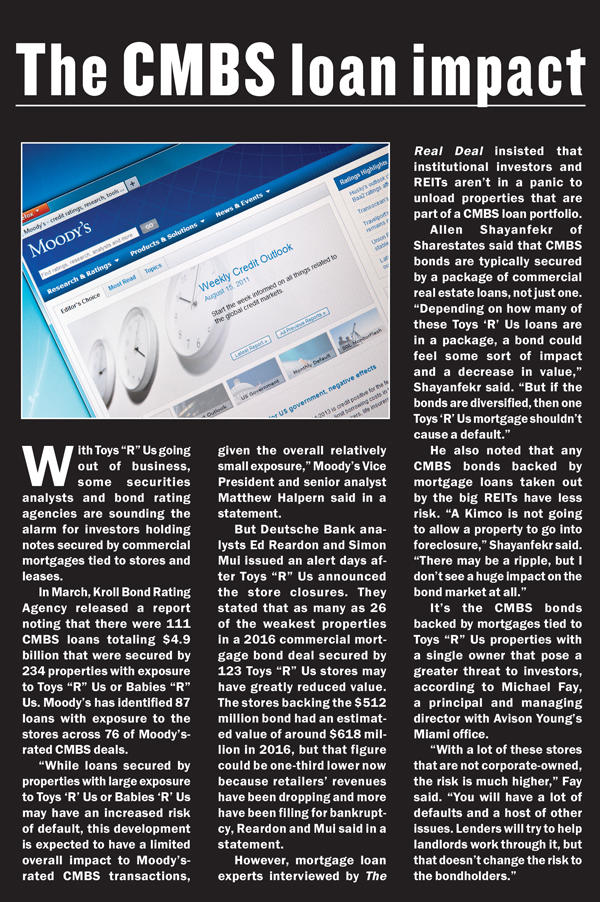Retail real estate these days can seem like a choose-your-own-adventure of sorts, with a variety of plausible story lines for all the players involved. Pivot to be experiential? Yes. Rebrand? Yup. Relaunch online? Affirmative. Chapter 11? Check. This last ending — filing for bankruptcy — is among the most prevalent plot lines, affecting not just retailers but landlords, brokers and lenders. And it is certainly the most visible on the retail landscape today.
During a recent research tour of malls and shopping centers, Avison Young’s Joshua Ladle and his team counted 16 empty big-box stores in South Florida’s Broward County. He’s watched as a parade of big-box retailers leave stores empty due to either bankruptcy or major cutbacks.
“We’re going to continue to see other big-box retailers come and go, but there will be replacements, or new uses filling those boxes,” Ladle predicted. “What happens more often than not — for those sites that are well-located — the next time I drive by those centers, six months later, there is a ‘Coming Soon’ sign for some other national big-box retailer.”
With Toys “R” Us announcing in mid-March that it would close all of its 800 U.S. stores, Ladle’s theory is about to be put to the test. What happens with those locations could serve as a guide to how things will play out across the retail real estate landscape nationwide as landlords and brokers scramble to reclaim, reposition and re-tenant properties amid mushrooming vacancies. One estimate put the available space at the end of this year at roughly 70 million square feet due to store closings by Walmart, Sears and HH Gregg, and of course the brand repped by Geoffrey the Giraffe, among other retailers.
More than half of the closing Toys “R” Us stores are leased to the toy retailer by a dizzying spectrum of landlords, from obscure mom-and-pop commercial real estate firms to big-name real estate investment trusts.
 “About 500 Toys ‘R’ Us stores are leased,” said Jan Rogers Kniffen, a former retail executive and one of the country’s leading retail consultants. “And there are like a zillion freaking landlords. Almost every one of these stores is going to have an individual solution. No one is talking about taking a huge block of stores. It’s all going to be one-offs.”
“About 500 Toys ‘R’ Us stores are leased,” said Jan Rogers Kniffen, a former retail executive and one of the country’s leading retail consultants. “And there are like a zillion freaking landlords. Almost every one of these stores is going to have an individual solution. No one is talking about taking a huge block of stores. It’s all going to be one-offs.”
Complicating matters is the fact that landlords are at the mercy of the courts when it comes to reclaiming properties from bankrupt tenants. In the case of Toys “R” Us, the company has sought court approval to assign about a quarter of its leases to new tenants, and if the retailer gets the go-ahead, landlords will not get a say in the matter. The remaining unexpired leases are being put up for auction, where landlords have to bid against institutional investors, REITs and big-box retailers.
To get a handle on the fates of the hundreds of shuttering Toys “R” Us stores, the role of the broker community in how things will unfold and the takeaways for the wider world of retail real estate, The Real Deal interviewed some of the nation’s leading retail real estate experts. By all accounts, many varying scenarios are in play.
Can brokers cash in?
Commercial leasing and sales brokers are bound to see more opportunities as Toys “R” Us and other big-box retailers liquidate real estate assets and look for new tenants, experts say.
In some cases, national retail brands are retaining brokerages to identify below-market leases for prime locations that Toys “R” Us intends to sell at auction. In other instances, the landlords looking to replace one of the toy stores with a more viable retail tenant are connecting with brokers trying to work out favorable lease terms for clients.
Avison Young’s Ladle said commercial brokers definitely benefit from the increased transactions in the marketplace when retailers liquidate leases and stores. “Brokers will represent banks, special servicers and landlords in assisting them with the sale of their property,” Ladle said. “On the other side of the table, brokers will also represent investors and buyers interested in purchasing these properties, and leasing agents benefit from re-leasing these properties.”

Josh Ladle
Miami-based CREC — which handles Florida leasing for Kohl’s, 24 Hour Fitness and Target, among others — is actively seeking out Toys “R” Us and Babies “R” Us locations in the Sunshine State for a big-box retail client, said Alan Esquenazi, a partner at the brokerage. Though he did not want to disclose the retailer’s name, Esquenazi said CREC helped the client negotiate a contract to take over a Babies “R” Us store in Altamonte Springs, Florida, and that his firm is also in negotiations for a lease of another store in Fort Lauderdale. Esquenazi said he also has other clients interested in bidding for Toys “R” Us leases in primary markets like New York City, Chicago, South Florida and Southern California.
“There are many opportunities for retailers to obtain an unexpired lease that is below market in a good location,” Esquenazi said. “A regional chain like Sedano’s supermarket can walk right in and get in cheap. Of course, they would take it.”
That means brokerage firms like CREC can capitalize on the demise of Toys “R” Us by representing either tenants that want to take over a lease or, for example, a real estate investment trust that might redevelop the space or place its own tenants there, Esquenazi said.
“For brokers such as myself, it creates opportunities to identify and try to secure big boxes that become available,” he said. “It does create new business activity in commercial real estate.”
Katy Welsh of Colliers International is another commercial broker who handles leasing for a number of national brands interested in acquiring Toys “R” Us leases. “As early as last fall, we have been preparing for leasing opportunities that would be created by the bankruptcy,”
she said.
Bidding on liquidated leases and stores
Retailers have not had much luck beating out landlords in the pursuit of Toys “R” Us leases, according to court documents. As part of its bankruptcy strategy, Toys “R” Us retained A&G Realty Partners, a consulting firm based in Melville, New York, that specializes in assisting distressed retailers in the disposal of real estate assets.
On Jan. 31, A&G emailed a marketing flyer to approximately 260,000 potential buyers, which teased 39 Toys “R” Us and Babies “R” Us unexpired leases that were going up for auction on March 29. Another 19 stores owned outright by the toy chain were also on the auction block.

Family-oriented entertainment companies like Glowzone could also fill former standalone big-box stores like those Toys “R” Us leaves behind.
The firm did not respond to phone calls seeking comment, and court documents don’t explain why Toys “R” Us put up just 58 total stores for bid, but the toy chain has requested approval to sell all its remaining leases and stores in a June 11 auction.
Target, Aldi and Big Lots were among the big-box retailers bidding on multiple Toys “R” Us locations, as were REITs Federal Realty and Urstadt Biddle, according to press reports. At the end of the 10-hour March auction, current landlords won 30 out of 39 available leases, while Target, Aldi, Federal Realty and Urstadt Biddle came up empty, a review of the bankruptcy filings showed.
The high percentage of landlords that bought back leases at the March auction proves property owners are willing to pay a lot of money to control which new tenants move into the vacated spaces and, therefore, how much rent they can charge, Colliers’ Welsh said .
“That tells me they have new tenants lined up to take the space,” Welsh said. “It could be traditional grocery stores, furniture stores or discount stores like Big Lots.”
Landlord Samco Properties of Durham, North Carolina, had a tenant lined up when it submitted a winning bid of $800,000 to regain control of a property it had leased to Toys “R” Us. The private commercial real estate firm beat out Big Lots for the remainder of the lease on a 47,300-square-foot building at 3330 Westgate Drive. The News & Observer of Raleigh reported that Samco has already signed a new tenant, Hamrick’s, a discount fashion retailer headquartered in Gaffney, South Carolina.
CREC represented a retail client at the March auction that bid on the lease for a Toys “R” Us store located in the Palms at Town & Country, a shopping center in the Kendall neighborhood of Miami-Dade County, according to Esquenazi. Situated near U.S. Route 1, the Palms also counts Kohl’s, Nordstrom Rack, Dick’s Sporting Goods, Marshalls and Home Goods as anchor tenants. “A number of retailers pursued the Kendall store lease,” Esquenazi said. “All of them were outbid by the landlord.”

Katy Welsh
The Palms owner Weingarten Realty bid $3.6 million to acquire the lease for the 45,000 square foot store, the list of winning bidders showed. However, court documents do not list the terms of the lease, including the length or what the original lease was worth.
Weingarten has three other properties in its portfolio leased by Toys “R” Us, but those leases have not been put up for auction. A Weingarten spokesperson declined to comment on the company’s plans for the Toys “R” Us space at the Palms and the three other locations.
Recouping cash
John Bell, a managing director for capital markets with Transwestern Commercial Services, theorizes that the decision by Toys “R” Us to reject the $675 million buyout offer for its U.S. locations from toy mogul Isaac Larian indicates that the chain’s top executives and real estate advisors believe they can get better offers selling off the stores individually at auction. “They get more value that way, rather than selling the stores in bulk to one company or someone looking to rescue Toys ‘R’ Us,” Bell said.
But top-dollar bids for Toys “R” Us leases and stores during the March auction were few and far between.
Big Lots picked up leases for two stores in Woodridge, Illinois, and Fresno, California, for just $303,000, though the lengths of the deals were not made public.
Raymour & Flanigan, a discount furniture retailer, paid a combined $1.7 million to take over leases for a Toys “R” Us and a Babies “R” Us in New Jersey; $155,000 for a Toys “R” Us lease in Millbury, Massachusetts; and $250,000 for a Babies “R” Us lease in Manhattan’s Union Square. Again, court documents do not state the original terms and how much the leases were worth at the time of the auction.
Benderson Development Company, which owns and manages more than 700 commercial properties in 38 states, put in the highest offer for a Toys “R” Us store. Benderson outbid Federal Realty with a whopping $15.6 million offer to acquire a Toys “R” Us store in Emeryville, California. The firm also picked up two more stores, one in North Miami Beach for $1.5 million and another in Amherst, New York, for $110,000.
There is no big-box retailer out there looking to acquire a large block of Toys “R” Us stores, according to Allen Shayanfekr, CEO of Sharestates, a tech firm that provides investors with a platform to participate in vetted debt offerings. “They would make any overtures public so that Toys ‘R’ Us knows they want to get any available leases,” he said. “Given no one has, I don’t think there is a lot of interest in doing that.”
Alternative uses
Regardless of what becomes of the Toys “R” Us stores, the closings will further dampen an already dreary big-box landscape, said Phillip Hudson III, a Miami-based commercial litigator who specializes in bankruptcy and insolvency matters.
“There are fewer and fewer players vying for big-box space,” Hudson said. Retail analysts like Kniffen agree that there may not be enough big-box retailers left to fill stores vacated by the Sports Authority, HHGregg and now Toys “R” Us, to name just a few. “We are going to see online penetration rise from 10 percent today to about 50 percent in 2030,” Kniffen predicted. “If that holds true, then looking at these big boxes, I don’t see how all of them can survive.”

The shuttering of Toys “R” Us stores, coupled with closings by other big-box retailers, will create an overwhelming oversupply of retail space. “That is going to drive rent prices down,” Hudson said. “There is so much space coming back on the market the next couple of years that some landlords may end up in default of their loans because their debt-to-income ratios will be so off.”
Retail owners, particularly those with standalone properties — which are considered less desirable than those attached to shopping centers — or locations in suburban markets and “Smalltown, USA,” will need to get creative, CREC’s Esquenazi said.
“Landlords who will be getting their real estate back will need to do everything they can to maximize value,” said Esquenazi. “That might mean a bowling alley or repositioning the property for office, residential or government uses.”
Landlords could also turn to companies that provide co-working office spaces to replace tenants, Colliers’ Welsh said. “Some co-working firms like to take over these big boxes,” she said. “They like the high ceilings. They can do trendy interiors with high-end furniture.”
She said that family-oriented entertainment companies like Glowzone could also easily fill former standalone big-box stores. Glowzone offers bumper car rides, bowling, mini golf and other games in a glow-in-the-dark setting.
Another alternative, according to Shayanfekr, is for landlords and investors to target Toys “R” Us stores where the underlying property could be rezoned for other uses, like multifamily or office.
“Anyone who is simply looking to use it for retail is going to provide a lowball offer,” he said. “But if the asset is in an area where the zoning will permit converting the asset into something other than retail, it might generate more aggressive offers.”
What’s in store
The clock is ticking on Toys “R” Us’ real estate exit strategy. In preparation for the final June 11 auction, A&G has continued its marketing efforts with email blasts, postings on online message boards and advertisements in newspapers and newsletters, according to an April 19 motion in bankruptcy court. “A&G is confident that its communications and marketing efforts will reach a substantial portion of likely interested bidders and generate a competitive bidding process,” the filing stated.
Toys “R” Us is requesting a May 29 deadline for interested buyers to submit bids, followed by a June 5 date to qualify offers.
Kniffen said the outcome of the first auction in March doesn’t instill a lot of confidence that the Toys “R” Us stores and leases will be taken over by innovative landlords or retailers.
“Most of the stores didn’t generate more than one bid,” Kniffen said. “That shows you that there is not a lot of interest in those locations. There are not a lot of people bidding against each other to scoop up these boxes.”
